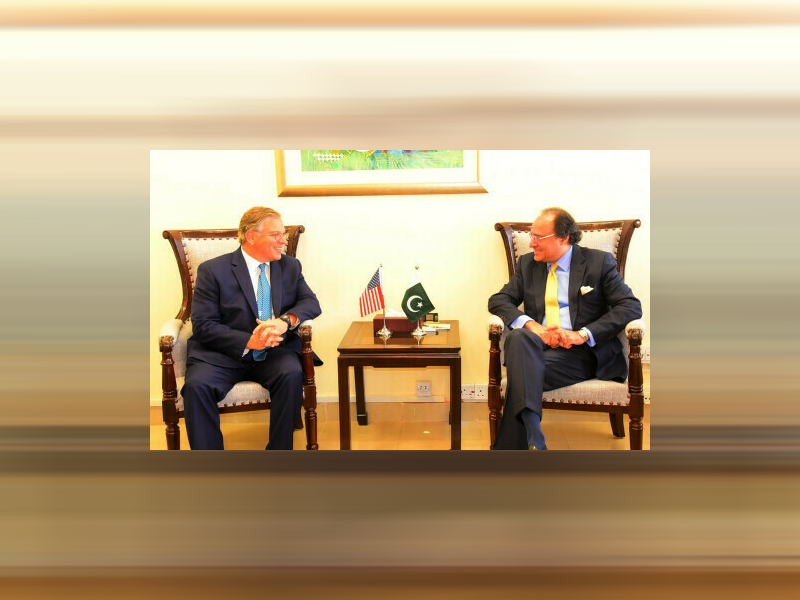Aurangzeb discusses economic reforms, climate resilience with US envoy

- 135
- 0
ISLAMABAD: In a significant meeting between Finance Minister Muhammad Aurangzeb and US Ambassador Donald Blome, discussions centered on Pakistan’s ongoing macroeconomic reforms and the pressing challenges the nation faces.
The meeting, held at the Finance Division, highlighted key areas of mutual interest, including climate change and child malnutrition, which the minister emphasized could hinder the country’s economic growth and stability. In a statement released by the Finance Division, Aurangzeb described the government’s macroeconomic reforms as a “work in progress.” He acknowledged the serious hurdles that climate change and child stunting pose to social equity and economic advancement in Pakistan. These issues, he noted, have the potential to disrupt the nation’s development trajectory over the medium to long term. Aurangzeb expressed Pakistan’s commitment to building resilience against climate change through a series of adaptation reforms.
He underscored the importance of averting malnutrition, particularly in vulnerable populations, and highlighted the necessity for technical and financial support from international development partners. “Holistic development goals cannot be achieved without addressing these fundamental challenges,” he stated. The finance minister reiterated the government’s determination to implement broad-based reforms in taxation, energy, and state-owned enterprises (SOEs). He pointed out the aim to raise the country’s tax-to-GDP ratio to 13.5 percent. This ambitious target, according to Aurangzeb, will be achieved by addressing tax leakages and integrating previously untaxed sectors into the national tax framework. “We are making concerted efforts to ensure that our fiscal policies are both equitable and effective,” he remarked. A pivotal aspect of the discussions was the recently approved comprehensive transformation plan for the Federal Board of Revenue (FBR). Aurangzeb revealed that the government has brought in experts to assist the FBR’s IT arm, PRAL, in modernizing its systems and enhancing tax collection efficiency.
“This is an essential step toward improving our revenue generation capabilities and ensuring that we have a robust financial framework,” he explained. Ambassador Blome acknowledged the complexities of Pakistan’s economic situation and praised the government for its resilience in tackling these challenges. He commended the bold and challenging reforms being implemented, particularly in the taxation and energy sectors. “We recognize the significant efforts being made to stabilize the economy and are encouraged by the initiatives undertaken to promote a more effective tax system,” Blome stated. The ambassador reaffirmed the United States’ commitment to enhancing bilateral cooperation, particularly in technical and development initiatives that can foster economic growth in Pakistan. He emphasized the importance of promoting high-quality US investment in the country, which could play a crucial role in bolstering economic resilience and creating job opportunities. During the meeting, the two officials also touched upon the potential impact of international cooperation in addressing the climate crisis. Aurangzeb noted that Pakistan, as one of the countries most affected by climate change, is in urgent need of support to develop infrastructure and systems capable of mitigating environmental risks. “We believe that our development partners can play a vital role in helping us build a sustainable future,” he said. The conversation further explored the interconnectedness of climate action and economic stability.
Aurangzeb explained that investments in climate resilience could not only safeguard the environment but also enhance economic productivity by reducing the vulnerabilities of communities to climate-related disasters. He urged for a collaborative approach, seeking both technical expertise and financial resources from international allies. In response, Blome expressed the US’s willingness to work alongside Pakistan in these endeavors, highlighting a range of programs aimed at supporting climate adaptation and resilience. He mentioned ongoing discussions regarding funding mechanisms and partnership opportunities that could facilitate Pakistan’s goals in this area. The meeting concluded with both officials expressing optimism about the future of US-Pakistan relations, particularly in the context of economic cooperation and development. Aurangzeb reiterated his belief that with continued support from the international community, Pakistan could overcome its challenges and achieve sustainable growth. He stressed the importance of unity and collaboration among all stakeholders to realize the nation’s developmental aspirations. As Pakistan navigates its economic reforms amidst significant challenges, the role of international partnerships will be crucial. The insights shared during the meeting with Ambassador Blome highlight a pathway forward, where climate resilience, improved taxation, and effective governance can collectively contribute to the country’s long-term stability and prosperity. In summary, the dialogue between Finance Minister Muhammad Aurangzeb and US Ambassador Donald Blome serves as a reminder of the intricate balance between addressing immediate economic concerns and planning for a sustainable future.
With the right support and commitment to reform, Pakistan aims to emerge stronger and more resilient in the face of ongoing challenges. As both leaders look to the future, their collaborative efforts may well define the next chapter in Pakistan’s economic journey.

















































